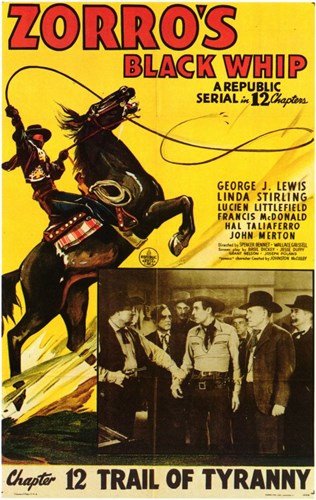
Zorro's Black Whip is a 1944 12-chapter film serial by Republic Pictures starring Linda Stirling. The film was made after the 1940 20th Century-Fox remake of The Mark of Zorro in order to capitalize on it. Republic was not able to use the character of Zorro himself, however, and despite the title, the hero(ine) is called The Black Whip throughout.
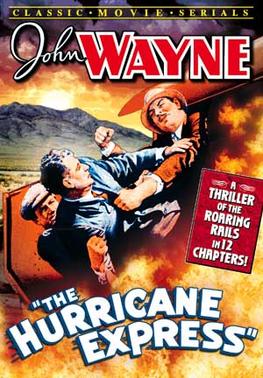
The Hurricane Express is a 1932 American Pre-Code 12-chapter Mascot Pictures film serial. Written by Colbert Clark, Barney Sarecky, Wyndham Gittens, George Morgan, and J.P. McGowan, the serial was directed by Armand Schaeffer and J.P. McGowan and produced by Nat Levine. The Hurricane Express stars John Wayne as aircraft pilot Larry Baker. Wayne goes after a mystery villain named "The Wrecker", who was responsible for a train crash that killed Baker's father.

Daredevils of the Red Circle (1939) is a 12-chapter Republic Movie Serial starring Charles Quigley, David Sharpe, Herman Brix, Carole Landis, Miles Mander and Charles Middleton. It was directed by William Witney and John English and is considered one of the better serials produced by Republic. The serial was the fourteenth of the sixty-six serials produced by the studio.

A masked villain, also seen as masked mystery villain, is a stock character in genre fiction. It was developed and popularized in movie serials, beginning with The Hooded Terror in The House of Hate, (1918) the first fully-costumed mystery villain of the movies, and frequently used in the adventure stories of pulp magazines and sound-era movie serials in the early twentieth century, as well as postmodern horror films where the character "hides in order to claim unsuspecting victims". They can also appear in crime fiction to add to the atmosphere of suspense and suspicion. It is used to engage the readers or viewers by keeping them guessing just as the characters are, and suspension by drawing on the fear of the unknown. The "Mask" need not be literal, referring more to the subterfuge involved.
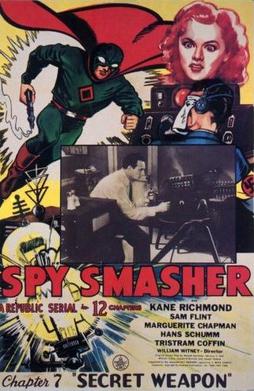
Spy Smasher is a 12-episode 1942 Republic serial film based on the Fawcett Comics character Spy Smasher which is now a part of DC Comics. It was the 25th of the 66 serials produced by Republic. The serial was directed by William Witney with Kane Richmond and Marguerite Chapman as the leads. The serial was Chapman's big break into a career in film and television. Spy Smasher is a very highly regarded serial. In 1966, a television film was made from the serial footage under the title Spy Smasher Returns.

Batman is a 1943 American 15-chapter theatrical serial from Columbia Pictures, produced by Rudolph C. Flothow, directed by Lambert Hillyer, that stars Lewis Wilson as Batman and Douglas Croft as his sidekick Robin. The serial is based on the DC Comics character Batman, who first appeared in Detective Comics #27 in May 1939. The villain is an original character named Dr. Daka, a secret agent of the Japanese Imperial government, played by J. Carrol Naish. Rounding out the cast are Shirley Patterson as Linda Page, Bruce Wayne's love interest, and William Austin as Alfred, the Wayne Manor butler.
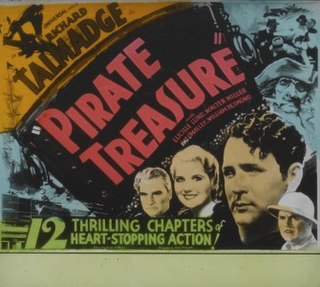
Pirate Treasure is a 1934 Universal film serial. It was the twenty-first sound serial released by Universal, of the sixty-nine they released in total. It was a rare example of the swashbuckling genre in the film serial medium.

The Red Rider is a 1934 American Western film serial from Universal Pictures and starring Buck Jones. It has 15 chapters based on the short story "The Redhead from Sun Dog" by W. C. Tuttle, and is a remake of Buck Jones' earlier 1931 film The Range Feud.
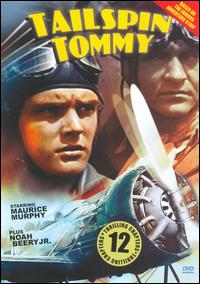
Tailspin Tommy is a 12-episode 1934 Universal film serial based on the Tailspin Tommy comic strip by Hal Forrest. Directed by Lew Landers and produced by Milton Gatzert, the serial was the 97th serial of the 137 released by that studio. The plot of Tailspin Tommy concerns a conflict over a government airmail contract.

Junior G-Men of the Air is a 1942 Universal film serial starring the Dead End Kids and the Little Tough Guys. A group of youthful flying enthusiasts join the "Junior G-Men" to help break up a planned attack on the United States.

Winners of the West is a 1940 American Western film serial from Universal Pictures, directed by Ford Beebe and Ray Taylor. It stars Dick Foran and Anne Nagel in a plot about the construction of a railroad and a local ganglord, who opposes it. It was Universal's 115th serial release.
Riders of Death Valley is a 1941 American Western film serial from Universal Pictures. It was a high budget serial with an all-star cast led by Dick Foran and Buck Jones. Ford Beebe and Ray Taylor directed. It also features Lon Chaney Jr. in a supporting role as a villainous henchman as well as Noah Beery Jr., Charles Bickford, Guinn "Big Boy" Williams, Monte Blue, Roy Barcroft, Richard Alexander and Glenn Strange.

Lost City of the Jungle is a 1946 Universal movie serial.

The Mysterious Mr. M is a 1946 Universal Pictures movie serial, the 137th and last serial produced by Universal.

Lemuel Dorcas is a fictional character appearing in American comic books published by Marvel Comics. He is notable for playing a part in the origins of Namor villains Tiger Shark, Orka, and Piranha.

The Spider Returns is a 1941 15-chapter Columbia movie serial based on the pulp magazine character The Spider. It was the fourteenth of the 57 serials released by Columbia and a sequel to their 1938 serial The Spider's Web. The first episode runs 32 minutes, while the other 14 are approximately 17 minutes each.

The Shadow (1940) was the ninth serial released by Columbia Pictures. It was based upon the classic radio series and pulp magazine superhero character of the same name.
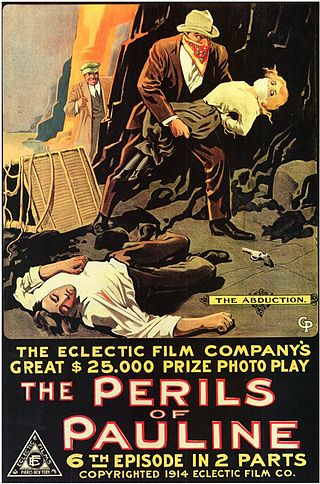
The Perils of Pauline is a 1914 American melodrama film serial produced by William Randolph Hearst and released by the Eclectic film company, shown in bi-weekly installments, featuring Pearl White as the title character, an ambitious young heiress with an independent nature and a desire for adventure.

Stanley Price was an American film supporting actor who appeared in over 200 films between 1922 and 1956. He was a charter member of the Screen Actors Guild.

A serial film,film serial, movie serial, or chapter play, is a motion picture form popular during the first half of the 20th century, consisting of a series of short subjects exhibited in consecutive order at one theater, generally advancing weekly, until the series is completed. Usually, each serial involves a single set of characters, protagonistic and antagonistic, involved in a single story, which has been edited into chapters after the fashion of serial fiction and the episodes cannot be shown out of order or as a single or a random collection of short subjects.


















